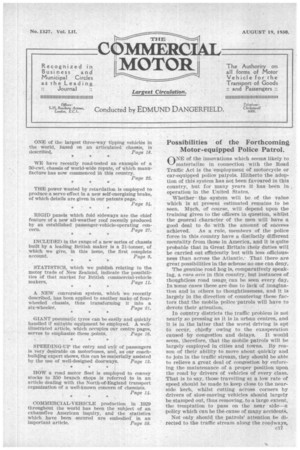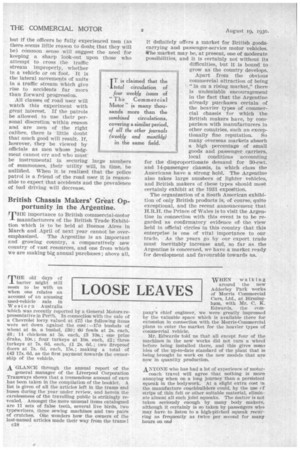Possibilities . of the forthcoming Motor-equipped Police Patrol.
Page 39

Page 40

If you've noticed an error in this article please click here to report it so we can fix it.
ONE of the innovations which seems likely to materialize in connection with the Road Traffic Act is the employment of motorcycle or car-equipped police patrols. Hitherto the adoption of this system has not been favoured in this country, hut for many years it has been in , operation in the United States.
Whether the ,systern will be of the value which is at present estimated remains to be seen. Much, of course, will depend upon the training given to the officers in question, whilst the general character of the men will have a good deal to do with the amount of success achieved. As a rule, members of the police force in this country have a distinctly different mentality from those in America, and it is quite probable that in Great Britain their duties will be carried out efficiently but with less officiousness than across the Atlantic.That there are great possibilities in the scheme DO one can deny.
• The genuine road hog Is, comparatively speaking, a ram avis in this country, but instances of thoughtless road usage, can be seen every day. In some cases these are due to lack of imagination and in others to thoughtlessness, and it is largely in the direction of countering these factors that the mobile police patrols will have to devote their attention, In country districts the traffic problem is not nearly so pressing as it is in urban centres, and it_is in the latter that the worst driving is apt to occur, chiefly owing to the exasperation caused by congestion and delays. It would seem, therefore, that the mobile patrols will be largely employed in cities and towns. By reason of their ability to move about quickly and to join in the traffiC stream, they should he able to relieve a great deal of congestion by enforcing the maintenance of a proper position upon the road by drivers of vehicles of every class. That is to say, those travelling at a low rate of speed should be made to keep close to the nearside kerb, whilst cutting across corners by drivers of slow-moving vehicles should largely be stamped out, thus removing, to a large extent, the temptation to pass on the near side—a policy which can he the cause of many accidents.
Not only should the patrols' attention be directed to the traffic stream along the roadways, but if the officers be fully experienced men (as there seems little reason to doubt that they will be) common sense will suggest the need for keeping a sharp look-out upon those who attempt to cross the traffic stream improperly, whether in a vehicle or on foot. It is the lateral movements of units in a traffic stream which give rise to accidents far more than forward progression.
All classes of road user will watch this experiment with great interest. If the patrols be allowed to use their personal discretion within reason and are men of the right calibre, there is little doubt that much good will result. If, however, they be viewed by officials as men whose judgment cannot err and who must' be instrumental in securing large numbers of summonses, their utility will, in time, be nullified. When it is realized that the police patrol is a friend of the road user it is reasonable to expect that accidents and the prevalence of bad driving will decrease. •
British Chassis Makers' Great opportunity in the Argentine.
:r HE importance to British commercial-motor -1manufacturers of the British Trade Exhibition which is to be held at Buenos Aires in March and April of next year cannot be overemphasized. The Argentine is an important and growing country, a comparatively new country of vast resources, and one from which we are making .big annual purchases ; above all, It definitely offers a market for British goodscarrying and passenger-service motor vehicles.
he market may be, at present, one of moderate possibilities, and it is certainly not without its difficulties, but it is bound to grow as the country develops. Apart from the obvious commercial attraction of being "in on a rising market," there is undeniable encouragement in the fact that the Argentine already purchases certain of the heavier types of commercial chassis for which the British makers have, by comparison with manufacturers in other countries, such an excep tionally fine reputation. So many overseas markets absorb a high percentage of small goods and passenger carriers, local conditiOns accounting for the disproportionate demand for 30-cwt. and 14-passenger chassis, in which class the Americans have a strong hold. The Argentine also takes large numbers of lighter vehicles, and British makers of these types should most certainly exhibit at the 1931 exposition. The organization of a South American exhibition of only British products is, of course, quite exceptional, and the recent announcement that H.R.H. the Prince of Wales is to visit the Argentine in connection with this event is to be regarded as confirmatory evidence of, the view held in official circles in this country that this enterprise is one of vital importance to our trade. As the years go by our export trade must inevitably increase and, so far as the Argentine is concerned, we have a market ready for development and favourable towards us.












































































































